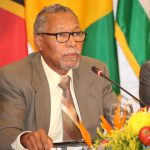New Phase of CEBO Youth Entrepreneurship Programme Begins in Belize

The first of a new phase of the CEBO entrepreneurial workshops for youth began in Belize on Tuesday. The seminar is being held at the Department of Youth Service and is being facilitated by Regional CEBO Consultant, Mr. Richard Berwick.
The objective of the CEBO (Creativity for Employment and Business Opportunity (CEBO) project is to engage, inspire and create entrepreneurial interest and action among young CARICOM nationals. It targets those who are both in and out of school and from all walks of life, as a means of countering youth unemployment, mitigating drug abuse, crime and violence, and fostering economic resilience.
The CEBO model, which was piloted in five Member States in 2012–2013, and rolled out in an additional seven Member States in 2014–2015, consists of the following components: Partnership Meetings, Regional Training of Trainers, Community-Based Workshops, Business Development Workshops and National Training of Trainers.
As part of the implementation of the CEBO Project, manuals for entrepreneurship training and workshop facilitation were drafted, tested and published. The CEBO Participants Manual was developed as the main training aid. It emphasises creativity, teamwork and learning by doing, and is delivered through practical, hands on, interactive and fun icebreakers, energisers, visual aids and practical/simulated exercises.
This new phase of the project will include two other CARICOM Member States Barbados and Haiti along with Belize, Jamaica, St. Vincent and the Grenadines and Trinidad and Tobago, which have previously experienced CEBO interventions. An added component of the project for this new phase is the inclusion of training for deportees as a means of reducing recidivism, assisting with re-integration into society and reducing criminal activity.
The CARICOM Secretariat has worked in collaboration with Member States and development partners to implement the CEBO Programme since the project was first piloted. The Governments of Italy, Japan and Spain, the United Nations Development Programme (UNDP) and The United States Agency for International Development (USAID) have provided support for the Programme.
Assistance for this new phase of the project has been given by the European Union via funding through the 10th Economic Development Fund (EDF). The workshop in Belize is scheduled to conclude on Friday 4 October 2019.
Source: CARICOM TODAY

 Previous Post
Previous Post Next Post
Next Post